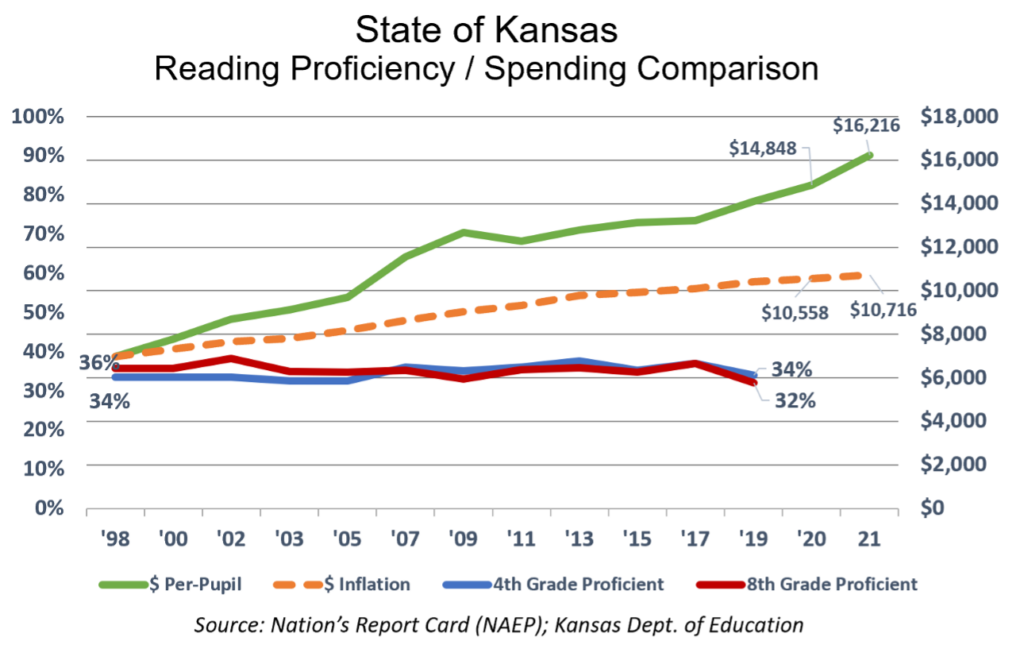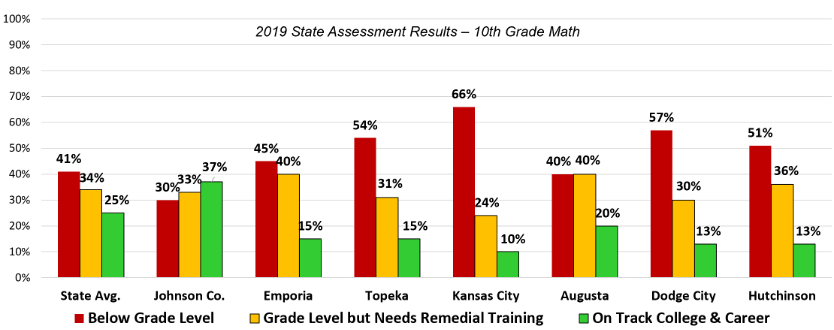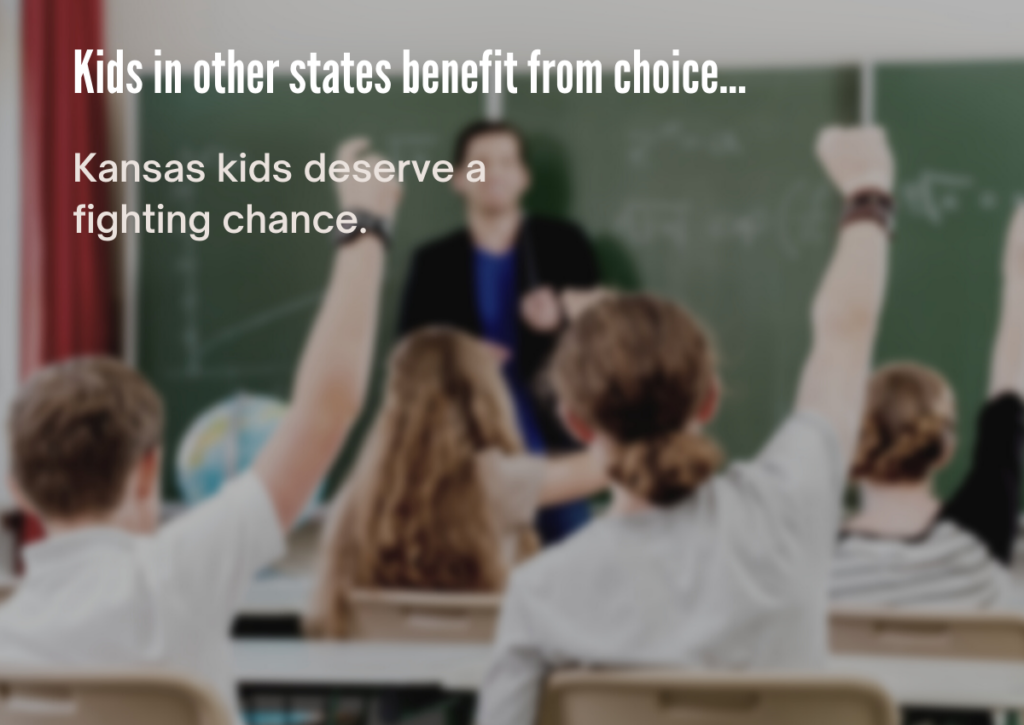[vc_row][vc_column][vc_column_text]While Indiana is busy expanding school choice eligibility from 37,000 to 48,000 students, Kansas is resisting even slight changes to existing school choice programs. What’s more, a Wall Street Journal editorial last week congratulated Indiana “for its leadership in establishing one of America’s most ambitious school voucher programs,” after the legislature expanded its primary school choice program.
Following the pioneering leads of Arizona and Florida, Indiana legislators are giving students a fighting chance, and the results are remarkable.
 Between 2011 and 2019 (the latest data available), Indiana students’ reading proficiency improved by 12% in the 4th grade (from 33% proficient to 37%) and by 16% in the 8th grade (from 32% to 37%). Arizona students improved from 26% proficient in the 4th grade to 31%; 8th grade proficiency held steady at 28%. Students in Florida also improved, going from 35% to 38% proficient for 4th-graders and from 30% to 34% for 8th-graders.
Between 2011 and 2019 (the latest data available), Indiana students’ reading proficiency improved by 12% in the 4th grade (from 33% proficient to 37%) and by 16% in the 8th grade (from 32% to 37%). Arizona students improved from 26% proficient in the 4th grade to 31%; 8th grade proficiency held steady at 28%. Students in Florida also improved, going from 35% to 38% proficient for 4th-graders and from 30% to 34% for 8th-graders.
But proficiency went backwards in Kansas, declining by 6% for 4th-graders and by 9% for 8th-graders. Proficiency fell from 36% to 34% in the 4th grade and 8th-grade results declined from 35% to 32%.
The above results are for all students, but low-income students also had impressive gains. Arizona, Florida, and Indiana students all improved but Kansas students went backward.
Despite these stark differences, Kansas unions, school administrators, and others vehemently oppose efforts to give better opportunities to the students who need the most help.
Opposition isn’t about student needs
Opposition to money-follow-the-child programs comes from two camps that are oddly on opposite ends of political ideology. At one end, unions and bureaucrats are in the ‘more government’ camp. At the other end, some people fear that choice will compromise private schools by making them more like public schools.
They have very different perspectives but there is one thing in common – none of their objections consider what students need.
The education bureaucracy camp for decades has been saying, “just give us the money we want and the results will eventually improve.” But achievement has gotten worse, while school spending increased much faster than inflation.
Those in the education bureaucracy camp also claim that our support of choice to drive achievement gains is driven by ideology. If by ideology they mean a belief that schools increasingly being run out of DC and Topeka are ill-suited to serve our 500,000 public school kids equally well using a one-sized-fits-all model…then they would be right.
Ideology, by the way, is not a bad thing; it is a collection of ideas and beliefs. It’s amusing that some people hurl ‘ideologue’ as an insult, perhaps without realizing that they, too, are ideologues.
The (disproven) objections of education officials get a lot of media attention, but some of the fears from the other camp are often ignored.
Choice doesn’t turn private schools into government schools
Those who oppose choice for fear that it would harm private schools may come from the best of intentions, but private schools thrive with choice (and so do students). The best way to deal with any fear is to tackle it head on. So let’s examine a few of the most common, with input from EdChoice Policy Director Jason Bedrick. EdChoice was formerly the Friedman Foundation for Educational Choice, which was founded by economist Milton Friedman
Private schools that take the money will not be controlled by government. Most of the school choice programs nationwide have a very light touch when it comes to regulations, including in Kansas. Here, the programs (implemented and proposed) allow participating private schools to be accredited by a variety of private organizations other than the Kansas Department of Education. Also, any money going to private schools is under the direction of parents, not the Department of Education.
Accepting federal or state money does not obligate private schools to teach Common Core, critical race theory, social emotional learning, etc. Private schools, as well as Kansas public schools, are not held to any curriculum standards even if they take state or federal money. Curriculum decisions in Kansas are made solely by local school boards or the individual private school. Local school boards can opt-out any time they wish.
The system cannot be fixed without legislative intervention
If it was possible to fix the system without legislative intervention, it would have been done over the last five or six decades. It’s not for a lack of trying, however.
Joy Eakin, a former Wichita School District Board member, explained in her testimony in support of school choice legislation this year.
“In 2013, I staunchly opposed measures like this bill. I believed we could bring change from the inside and fix these issues for our most vulnerable students. But now I’m here today asking you to pass this bill because I got a good look at the inside of the system.”
Here’s the ugly truth. Local school boards are not held accountable for improving student achievement and the education bureaucracy ferociously fights against every accountability attempt. There simply is no incentive to do better.
The possibility of losing a dollar is the only thing that gets the bureaucracy’s attention. Competition to retain students forces school officials to do better by students, as shown by the results in Indiana, Florida, and Arizona.
Per-student funding for each district remains the same. Even in states with robust private school choice, the public schools are still funded for the students enrolled in those institutions. The funding question now facing the legislature is ‘do we keep doing the same things and hoping that achievement will increase at some point in the distant future, or do we give a different opportunity now to the students who most need it’.
Opposing choice condemns students to a lifetime of underachievement
There’s also objection from a third fringe camp, with the preposterous theory that choice is some grand conspiracy to put private schools under control of public schools. That’s right up there with the moon landing being fabricated on a Hollywood sound stage.
People support school choice because they know it works for students. There is no single, perfect solution to get students the opportunity they deserve but choice is a big part of the all-of-the-above effort, and the results show that it works. Parents clamor for more choice and that’s what matters the most.
Two questions should front of mind when evaluating choice and other reforms.
- How long do you think it will take the public school system to get tens of thousands of students to grade level without legislative intervention?
- What do you say to the generations of students that will be left behind in the meanwhile?
We cannot escape that there are more high school students below grade level than are on track for college and career, and results are getting worse.
Only 23% of Kansas high school graduates taking the ACT last year were considered college-ready in English, Reading, Math, and Science. Just a third of 4th-graders and 8th-graders read proficiently according to the National Assessment of Educational Progress.
While Kansas has been going backward, Florida’s combination of choice, transparency, and accountability propelled low-income 4th-graders from about the worst in the nation to the best. Now, the Florida Legislature is further expanding choice, prompting the Wall Street Journal to call Florida “an education refuge for low- and middle-income families.”
Kansas students deserve no less. All it takes putting students’ interests above all else.
[/vc_column_text][/vc_column][/vc_row]





